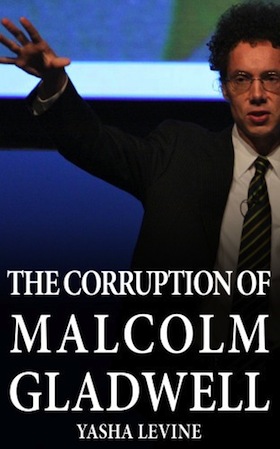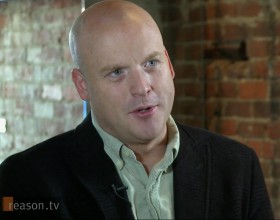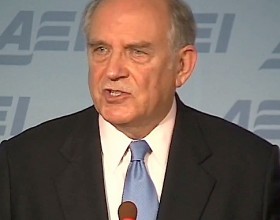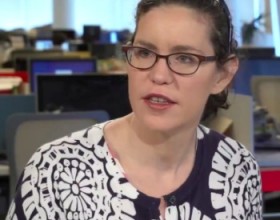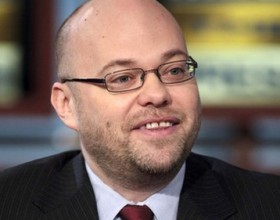
In case you missed it: The New York Observer picked up the S.H.A.M.E. exposé on NPR host Adam Davidson last week, and came to the conclusion that S.H.A.M.E. "made a compelling case that Davidson is—if not complicitly, then inherently—conflicted."
The Observer's Foster Kamer followed up the SHAME report on Adam Davidson's financial ties to the same Wall Street banks he reports on, reports on: The speaking fees Davidson earns from the banking industry, and Planet Money's exclusive funding arrangement with Ally Bank. Formerly known as GMAC, Ally Bank is a poster child of everything wrong, predatory, and criminal about Wall Street banks today. It was one of the worst offenders in the subprime bubble and foreclosure fraud scandals, and has received some $17 billion in bailout funds from US taxpayers since it went belly up in 2008. Incredibly, taxpayer funds were then used to lobby against taxpayer interests in Congress, as Ally Bank spent hundreds of thousands of dollars lobbying against banking regulations that might prevent Ally Bank from yet another collapse.
A chunk of Ally's taxpayer bailout money also has been used to underwrite Davidson's show about the banking industry. This arrangement between NPR's finance program Planet Money, and its sole sponsor Ally Bank, violates not only standard journalism ethics, but also the explicit policies of co-producer Chicago Public Media, which bars its journalists from taking money from the industry its journalists report on.

Davidson is a textbook case of why journalists should not be allowed to take money from the industry they report on, and why conflict-of-interest guidelines and policies are essential: Davidson's Planet Money radio reports, and his New York Timescolumns, routinely boost for Wall Street interests on a scale that can be downright shocking. Worse, Davidson's messages on his public radio shows have dovetailed with Ally Bank's lobbying campaigns.
In other words, Adam Davidson is paid by the banks, and he goes on the radio promoting the banks' interests. That makes Adam Davidson little more than a glorified Shamway Guy for Wall Street, a product spokesman for the financial industry under the guise of a credible journalist.
The Observer's Foster Kamer reached out to NPR and the New York Times to comment on the evidence provided by SHAME. NPR's head of communications Dana Davis Rehm initially responded positively to Kamer's query: "I expect we’ll give you comment on why we didn’t comment before, and perhaps on some of these issues you raise." For a brief moment, it appeared as though NPR might correct its lapse of journalism ethics.
That was last Wednesday, August 8th. The following morning, Davis Rehm and the rest of the NPR crew circled the wagons and adopted the old mob legal strategy of taking the 5th, telling the Observer:
"Adam reviews all his speaking engagements with his editors and we’re confident that none of them run counter to our ethical guidelines. Beyond that, we don’t have any further comment."
Sadly, NPR ducked its responsibilities to its listeners, and failed to live up to to its pretensions to high journalistic standards. Instead, they chose to ignore the Observer's requests to explain why, for example, Planet Money's negative coverage of the proposed Financial Financial Consumer Protection Agency in 2009 (when Davidson smeared Elizabeth Warren) dovetailed with Ally Bank's massive lobbying efforts against the same agency at the very same time. NPR decided that this was just fine.
The New York Times likewise chose to take the 5th and issue an embarrassing official response to the Observer about our allegations over their columnist's conflicts of interest, telling Kamer:
"We have discussed this situation with Adam and we’re confident that there has been no violation of our policies around speaking engagements and no conflict of interest."
There you have it: The corrupt and sorry state of the US major media.
We applaud the Observer and Foster Kamer for doing their best to hold two of this country's most powerful media institutions accountable for journalistic corruption. And we urge others to keep holding corrupt media shills and their enablers accountable. If we ever want a chance to reclaim our democracy from oligarchy power—which relies on corruption and propaganda to maintain its grip and keep the public confused, powerless and demoralized—we have to make life harder on the oligarchy's media pawns. And that means flushing them out into the open, and SHAME-ing them.
Read the entire New York Observer article here.
And remember, we "Rogue Media Ethicists" need your support to continue our work and build on our successes, to make the oligarchy's job a little harder, and ours more effective.

